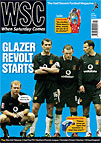 Tom Davies gives us our regular update on clubs in crisis
Tom Davies gives us our regular update on clubs in crisis
There will doubtless have been knowing shaking of heads in various parts of the country over recent developments at Cardiff City. Debts of around £30 million have come to light and plans for a new home on the site of the nearby athletics stadium at Leckwith have struggled to get off the ground.
The scale of the club’s predicament emerged with the sale of Graham Kavanagh to Wigan in March and City’s subsequent brush with administration. Controversy was added when the Professional Footballers’ Association then loaned the club money to cover wages, a decision that provoked fury from rivals in the Championship relegation dogfight who claimed that the loan saved Cardiff from administration and a ten-point deduction. The PFA insisted that the loan, which they said was around £500,000, covered only outstanding payments to players, and while Bluebirds vice-chairman Michael Isaac also provided temporary respite with an interest-free loan of around £1.5m, the club’s subsequent signing of Neal Ardley and Michael Boulding only fuelled other clubs’ sense of injustice.
Cardiff fans are more concerned about the cause of the debt and how both it, and the cost of the new stadium, are to be covered. Certainly, the Bluebirds have spent relatively freely in recent years, but the club maintained, in a letter to Welsh Assembly member Leighton Andrews, that much of the debt comes from unsecured loan notes issued to “non UK-resident investors”. These are not due to be paid off until 2011 and the letter said that the investors’ involvement demonstrated their “confidence in the club, its current management and the stadium project”. Hammam, meanwhile, was quoted in the South Wales Echo as saying, “We have a practical debt of £1.5m, which for a club like ours is not a big deal,” but that still leaves a ground to be paid for (their existing ground, Ninian Park, is council-owned for which City pay a peppercorn rent). Cardiff are depending on cash from an adjoining retail development to underpin the stadium project – they have assured fans that the retail partners are in place – but that still leaves the construction of the ground itself to be financed. The club claim that, once built, the 30,000-capacity stadium will earn them between £3m and £6m a year, though there’s clearly a way to go yet. It all leaves plenty of work for one Peter Ridsdale, called in to help on the project.
One club unable to avoid a ten-point deduction were Cambridge United, who slipped into administration at the end of April, shortly after their relegation from the League was confirmed. Liquidation also loomed last month, but an energetic fundraising campaign co-ordinated by the supporters’ trust, Cambridge Fans United , secured the £40,000 needed to demonstrate to the administrators that the club could carry on. They now aim to be out of administration by the end of June.
However, CFU still needs to raise £100,000 by July just to cover running costs and, with the club having lost both Football League status and ownership of their ground (as reported in WSC 218) as well as most of their first-team squad, the task remains an uphill one.
Carlisle United are moving in the opposite direction after winning promotion back to the League at the first attempt, but things haven’t run quite so smoothly off the field. The supporters’ trust is embroiled in a messy battle with chairman Fred Story over the trust’s stake in the club, a dispute enlivened by the involvement of millionaire Brooks Mileson, whose lavish bankrolling of Scottish League club Gretna was spotlighted in WSC 217.
Mileson has made £600,000 available to the trust to enable it to take a 40 per cent shareholding in the club to honour a deal struck with Carlisle’s previous owner, John Courtenay. Since then, Story, who succeeded Courtenay in the summer of 2004, has sought to go back on the agreement, claiming it was flawed and then asserting his right to dilute the trust’s shareholding to as little as 25.1 per cent through the issue of new shares.
Story argues that a smaller stake for the trust would make the club a more attractive proposition to investors (whoever they might be), but the trust is taking legal action to assert the primacy of the original agreement. Mileson, who has chipped in to cover various player costs at Brunton Park, offered the £600,000 donation to cover a shortfall on the funds needed to pay for the trust’s initial 20 per cent stake. There’s nothing to suggest that Mileson’s footballing largesse is anything other than philanthropic, but it has certainly created an unprecedented, and arguably over-dependent, position for a fans’ trust. Spokesman Alan Steel explained that the trust itself had approached Mileson, and that he “is a trust member with one vote, just like everyone else”.
Supporters of Barry Town have set up their own club, Barri Linnets, after the complete breakdown of relations with chairman Stuart Lovering. The financial and administrative problems at the once-dominant League of Wales club, reported in WSC 201, culminated in Barry’s relegation from the Welsh Premier League last year and their departure from the council-owned Jenner Park. They have recently been playing at Treforest FC’s White Tips stadium. Deteriorating relations between club and fans came to a head with supporters’ club officials complaining that chairman Stuart Lovering had prevented them carrying out fundraising activities at matches and banning supporters’ club officials from them.
Their confidence in Lovering tested beyond its limits, fans voted at a meeting last month to set up their own club, who will play in the Barry and District League, six rungs below the level at which the becalmed team they deserted are limping on.
From WSC 221 July 2005. What was happening this month